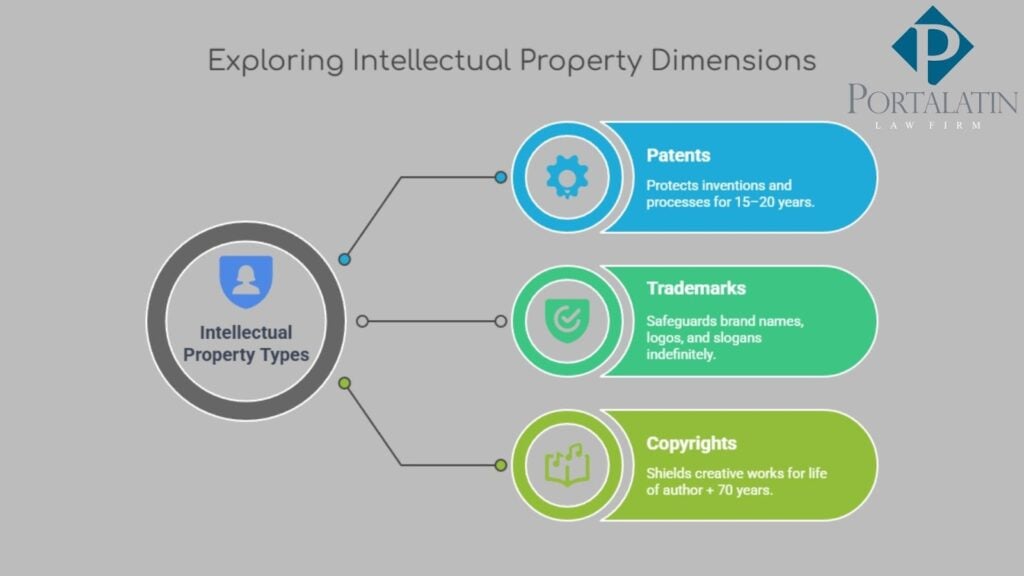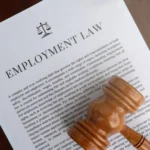If you’re building a business or launching a brand, protecting your ideas matters. Knowing when to use a patent, trademark, or copyright can save you time, and stress.
According to CRI Group, around 12,000 intellectual property cases (patent, copyright, trademark) are filed each year in the US. Understanding how these elements can impact your business is key to avoiding costly mistakes.
At Portalatin Business Law Firm, we help entrepreneurs, including those from Spanish- and Portuguese-speaking backgrounds, secure their work and stay protected. We work closely with branding teams to register trademarks in order to protect brands for the longterm.
Key Takeaways
- Patents protect new inventions like machines, software, or processes.
- Trademarks protect brand names, logos, and slogans tied to your business.
- Copyrights protect original creative works such as books, music, and videos.
- Each type of IP has different rules, costs, and benefits, knowing which one to use helps keep your ideas safe.
What is Intellectual Property?
Intellectual property (IP) is something you create that has value, like an invention, logo, or song. IP laws protect these ideas so others can’t use them without your permission.
There are three main types:
- Patents protect inventions (like machines or software).
- Trademarks protect brand elements (like names and logos).
- Copyrights protect creative works (like books, music, and art).
What is a Patent?
A patent protects inventions. It gives you the legal right to stop others from making, using, or selling your invention without permission.
As of March 2025, the USPTO reported an average of 22.5 months from patent application filing to the first office action.
To get a patent, your invention must be:
- New — not already known or used
- Useful — it must do something
- Non-obvious — not an easy idea anyone could come up with
There are three types:
- Utility patents – for machines, processes, software, or chemicals
- Design patents – for how something looks (not how it works)
- Plant patents – for new plant varieties you invent or discover
Patents must be registered, usually with the USPTO (U.S. Patent and Trademark Office). Protection lasts up to 20 years, depending on the type.
What is a Trademark?
A trademark protects anything that identifies your brand, like a name, logo, slogan, or even a sound.
It tells customers who made the product or service. If people recognize your brand, a trademark keeps others from copying it and confusing your audience. Businesses are not required to register a trademark, but registering gives stronger legal rights. In the U.S., that means applying through the USPTO.
In Fiscal Year 2024, the USPTO received over 765,000 trademark applications, relaying the importance of brand protection for businesses.
There are two common symbols:
- ™ means you’re claiming a trademark (even if it’s not registered).
- ® means it’s officially registered with the USPTO.
Trademarks can last forever, as long as you keep using them and renew registration every 10 years .
What is a Copyright?
A copyright protects original creative work, like books, songs, photos, videos, or artwork.The moment you create it, it’s protected. You don’t need to register, but registering makes it easier to prove ownership in legal disputes.
In Fiscal Year 2023, the U.S. Copyright Office registered over 441,000 claims, demonstrating the widespread use of copyright protection among creators.
Copyright gives you the right to:
- Copy or reproduce the work
- Distribute it
- Display or perform it
- Make adaptations or spin-offs
In most cases, copyright lasts for your lifetime plus 70 years. After that, the work enters the public domain.
Key Differences Between Patents, Trademarks, and Copyrights

Each type of IP serves a different purpose. Use the following table to quickly compare what each IP type protects, how long it lasts, and whether registration is required.
| Feature | Patent | Trademark | Copyright |
| Protects | Inventions and processes | Brand names, logos, slogans | Creative works (books, music) |
| Requires Registration for Legal protection? | Yes | No, but recommended | No, but needed to enforce rights. |
| How Long It Lasts | 15–20 years | Renewable every 10 years | Life of author + 70 years |
| Examples | Engine design, Slinky toy | Nike logo, McDonald’s “I’m lovin’ it” | Song “Ice Ice Baby” |
What Happens if You Don’t Protect Your IP?
If you skip IP protection, you risk:
- Copycats stealing your invention, brand, or content
- Losing legal ground if someone else registers it first
- Confusion in the market that hurts your business
- Missed income from licensing or selling rights
Once your work is public, anyone can take it, unless you’ve locked it down legally. Registering your IP gives you proof, power, and options if someone crosses the line.
Frequently Asked Questions
Q: Can I use ™ without registering?
Yes. ™ shows you’re claiming a trademark, even if it’s not officially registered. Only use ® if it’s registered with the USPTO.
Q: What’s cheaper, patent, trademark, or copyright?
Copyright is the cheapest. Trademarks cost more but are still affordable. Patents are the most expensive and more complicated to attain.
Q: Can I protect one IP with multiple types?
Yes. A product can have a patent for its design, a trademark for its brand, and a copyright for its manual or artwork.
Protect Your Ideas Before Someone Else Does
Understanding patents, trademarks, and copyrights is just the start, putting that knowledge to work is what keeps your business safe.
At Portalatin Business Law Firm, we don’t just file paperwork, we help you build a strategy that supports your brand, protects your creations, and aligns with your goals.
Ready to protect what you’ve built? Contact us here to get started.


